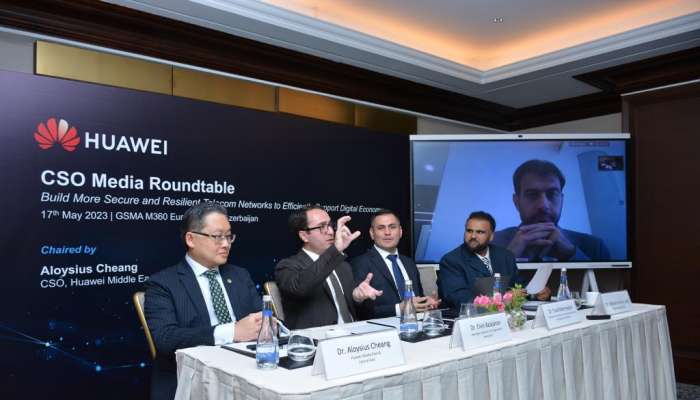
Muscat: As we live in a more digitally connected world, we are more and more vulnerable to cyber threats, highlighted by Dr. Haitham Hilal Al Hajri, Sr. Executive – Cyber Security Projects, Oman National CERT, on the sidelines of the GSMA M360 EURASIA 2023 conference in Baku, Azerbaijan. He underscored the importance of finding multi-faceted cybersecurity solutions in collaboration with industry partners and international regulatory bodies to safeguard our digital economy.
Dr. Haitham moderated an exclusive cybersecurity officers (CSO) roundtable at the high-profile industry event that featured panelists Dr. Tural Mammadov, Director of the Azerbaijan Computer Emergency Response Center (CERT), Dr. Mohammad Khaled, Director of Business Development and Strategic Projects, e& Enterprise, Dr. Elvin Balajanov, Chairman of the Board of the Azerbaijan Cybersecurity Organization Association and Dr. Aloysius Cheang, Chief Security Officer, Huawei Middle East & Central Asia.
Under the theme of “Build more secure and resilient telecom networks to support the future digital economy efficiently,” participants in the media roundtable discussed various topics, including collaborations among network operators and their partners, suppliers and customers in defending against telecom cybersecurity, how regulators Could promote local telecom industry's cybersecurity development, and the role that cybersecurity plays in safeguarding critical information infrastructure and the digital economy, among other topics.
The Oman National CERT cybersecurity expert highlighted that COVID-19 was a big inflection point in Oman's digitalization journey. “COVID was the number one driver for the development and uptake of digital services like e-government, e-financing, e-sports, etc. But the more we are connected, the more we will face cyber challenges,” explained Dr. Haitham.
“As an industry, we have to find a common ground or foundation that will enable us to standardize solutions and regulations,” added Dr. Haitham. He highlighted that when multiple stakeholders collaborate with each other and with governing bodies, cybersecurity solutions can become more robust, scaleable and adaptable.
The telecom industry has become an integral part of modern society and is recognized as a critical infrastructure industry (CII). It plays a vital role in connecting people, businesses and governments, facilitating communication, information sharing and commerce on a global scale. However, as telecom networks become more complex and interconnected, they become more vulnerable to cyber threats. Therefore, the cybersecurity of telecoms is a critical component of national security, and it is essential to bring together telecom stakeholders to promote the development and optimization of telecom cybersecurity.
Dr. Haitham said, “Cybersecurity is a shared responsibility and national security agencies, telecom providers and ICT industry players should work together to achieve a more robust cybersecurity posture, so telecom providers can continue to deliver cutting-edge digital services unimpeded by cyber threats.”
Dr. Aloysius Cheang, Chief Security Officer, Huawei Middle East & Central Asia, added, “We need to consider how to meet the increasingly strict compliance requirements of regulators on the one hand and how to provide secure and trustworthy products and services that fulfill our commitments to customers on the other. We must also embrace a defense-in-depth approach to provide better security, ensure business continuity, resiliency, improve efficiency and customer experience while always protecting user privacy.”
Dr. Haitham highlighted that the human factor is the most critical in cybersecurity and can be considered the most vulnerable target. “You can get a $5 million security solution, but if we put someone inexperienced in charge, they can be easily exploited with a phishing attack, which can then infect the whole network or system. This is why specialized training for cybersecurity professionals and cybersecurity awareness for the general population is crucial.”
Sharing his thoughts on cybersecurity training and the overall continued development of the industry, Dr. Aloysius highlighted the importance of Private Public Partnerships (PPP). He highlighted that Huawei actively works with governments, customers, and industry partners to address cybersecurity and privacy challenges, thereby reinforcing the need to treat cybersecurity as a team sport and maintaining an open and collaborative environment that encourages innovation and transparency.
Huawei has supported multiple ICT talent development programs in Oman, such as the Seeds for the Future programme, ICT Academy, internship programmes, and knowledge transfer. In December last year, Muscat hosted the regional finale of the Huawei ICT Competition Middle East 2022 under the patronage of His Highness Sayyid Taimur bin Asa'ad Al Said, Chairman of the Board of Governors of the Central Bank of Oman and in partnership with the Ministry of Transport and Communications and Information Technology, the Ministry of Labor, and Omantel.